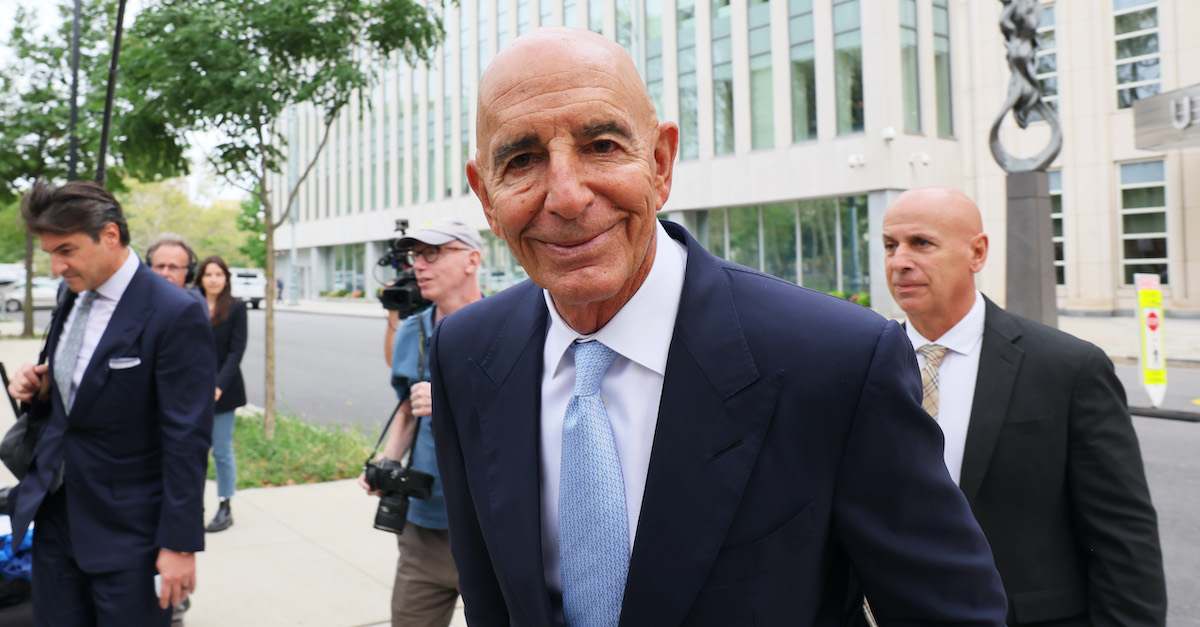
Tom Barrack, a former advisor to former president Donald Trump, leaves U.S. District Court for the Eastern District of New York in a short recess during jury selection for his trial on Sept. 19, 2022 in the Brooklyn borough of New York City. (Photo by Michael M. Santiago/Getty Images)
Donald Trump-tied tycoon Tom Barrack, the former chair of the former president’s inaugural committee, “illegally promised a foreign nation with access and influence to the United States government at the highest levels,” prosecutors told jurors as trial kicked off Wednesday.
Accused of acting as an illegal agent to the United Arab Emirates, Barrack is being tried along with his assistant Matthew Grimes, whom the businessman’s defense attorney described as a young man he mentored since eighth grade. The third defendant, UAE national Rashid Sultan Rashid Al Malik Alshahhi, remains at large and is also known as Rashid Al Malik and Rashid Al-Malik.
Delivering opening statements, Assistant U.S. Attorney Hiral Mehta said that Barrack referred to Al Malik as: “The UAE’s secret weapon to influence the United States.”
According to the government, Barrack — the founder and former CEO of Colony Capital — began exploiting his longtime access to Trump, developed over decades in real estate investment, on the campaign trail. The UAE spotted further opportunities once Trump was elected and sworn into office, prosecutors say.
Then, Barrack and Grimes used their “unique access to Donald Trump to gain power and money for themselves.” Prosecutors accuse all three of secretly exploiting Barrack’s ties to the Trump administration to do the UAE’s bidding, without necessary disclosure to the U.S. government. Barrack is being charged under the same statute used against Russian agent Maria Butina. The billionaire also faces obstruction of justice allegations for alleged lies to the FBI.
Mehta said Barrack “lied” to the agents.
“He lied to them again and again,” Mehta said, claiming Barrack falsely denied using secure communications at the UAE’s request and a “burner phone.”
Barrack pleaded not guilty to the charges, and his lawyer tried to persuade the jury that he is a falsely accused and innocent man.
According to his indictment, Barrack praised the UAE on national television on July 2016, before telling Al Malik in an email that he “nailed it” for the “home team.” Prosecutors say Barrack had been referring to the UAE, not the United States of America.
Barrack’s attorney Michael Steven Schachter said that the reason for that pronouncement had to do with his client’s immigrant origins. His parents fled Lebanon during the Ottoman Empire “with nothing but a few scraps of Turkish money in their pocket,” he said.
Distancing his client from the former president, Schachter described the “home team” remark as a rebuke to Trump’s then-promised Muslim ban, as an expression of Barrack’s pride in his Middle Eastern roots.
“We are a nation of immigrants, where people can love America and the land that they are from,” Schachter said.
Displaying an elaborate slideshow for the jury, the tycoon’s lawyer repeatedly hit upon a theme: “Tom Barrack Was His Own Man.” He likened Barrack’s business decisions to those of McDonald’s in embracing Ukrainian President Volodymyr Zelensky’s request for Western businesses to pull out of Russia after the war in Ukraine.
“Tom Barrack was never under anyone’s direction,” Schachter said. “Tom Barrack was never under anyone’s control. Tom Barrack was his own man.”
Prosecutors argue that Barrack was angling for the oil-rich country’s sovereign wealth funds billions in his own investment fund, which he secured. In return, prosecutors alleged, Barrack became the “eyes, ears and voice” of the UAE, securing conversations between Trump and its Crown Prince Mohamed Bin Zayed and a getting favorable reference to him in campaign speech.
Schachter said his client, who ran a $40 billion company with 14 offices in 10 countries, had relationships with multiple foreign leaders, including those of Qatar, which was the UAE’s adversary. He said that his client pushed Trump against the UAE’s interests, and for Qatar’s, in sharp contradiction to the allegations that he was the agent of the former. The lawyer added that while Barrack never filed a single page foreign lobbying form required by the Department of Justice, his client submitted 200 pages of disclosures during his brief time in the Trump administration.
During that time, Barrack turned down an ambassadorship to the UAE, Schachter claimed.
There is some controversy surrounding the scope of Barrack’s wealth. In 2013, Barrack made the Forbes billionaires list, but the magazine doubts that he holds the same status today. He had to post a $250 million bond to remain a free man before trial, but a jury will be insulated from the defendant’s tales of high living, Before trial, Senior U.S. District Judge Brian M. Cogan, who presided over El Chapo’s trial, barred prosecutors from alluding to Barrack’s wealth, spending and lifestyle, accepting the defense’s arguments that such evidence posed “a substantial risk of class bias.”
Grimes’s attorney Abbe Lowell, a prominent trial lawyer from Washington, D.C., depicted his client as a “then-22-year-old” simply following the directives of his boss, who wasn’t a “decision-maker,” “player,” or “foreign agent.” Lowell skewered prosecutors for merging the alleged conduct of the defendants together with the pronoun “they.”
“‘They’ did this. ‘They’ did that,” Lowell lampooned, urging jurors to hold prosecutors to their burden to prove each of the men guilty separately, beyond a reasonable doubt.
Lowell said his client cannot be found to have become a foreign agent “by accident.”
“He cannot do it inadvertently,” he added.
The first witness for the government is Christopher Davidson, from the European Centre for International Affairs, called as a Middle East expert. Trial is expected to last between roughly four to five weeks.